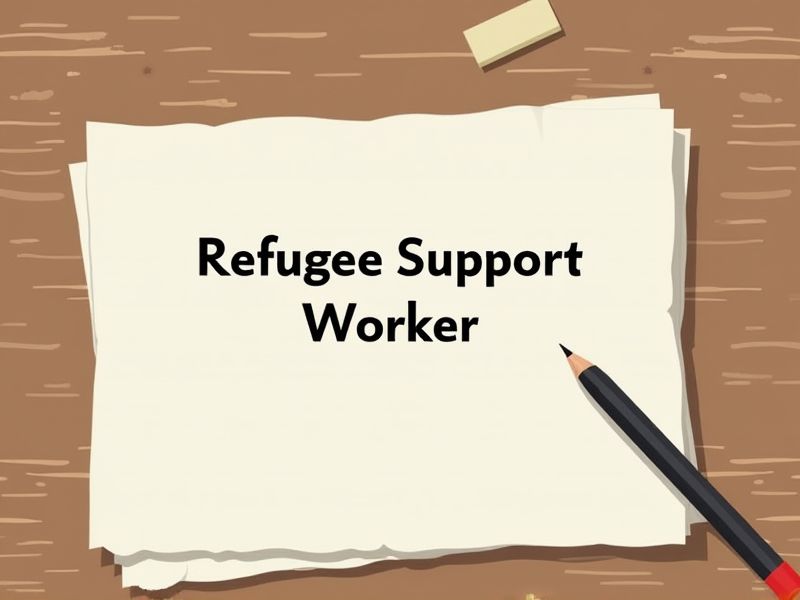
Refugee Support Workers play a crucial role in assisting individuals displaced by conflict or disaster, requiring specific skills to address complex needs. Certifications ensure these workers possess vital knowledge in trauma response, cultural competence, and legal frameworks. They also provide assurance of maintaining ethical standards crucial when handling sensitive information. Important certifications you may need for a Refugee Support Worker include a specialization in these areas.
Refugee Resettlement and Integration Certification
Refugee Resettlement and Integration Certification ensures that refugee support workers possess the necessary skills and knowledge to effectively assist refugees in navigating new cultural and social landscapes. Certification equips workers with updated information on policies and best practices, enhancing their ability to support refugees in accessing services and resources. This specialized training addresses the unique challenges refugees face, promoting a smoother transition and integration into society. Certification also enhances credibility and trust in the refugee support system, reassuring refugees and stakeholders about the quality of assistance provided.
Trauma-Informed Care Certification
Trauma-informed care certification equips refugee support workers with essential skills to recognize signs of trauma, leading to more effective interventions. Refugees often experience significant trauma, and untrained responses might inadvertently retraumatize individuals, further complicating their recovery. The certification provides an understanding of cultural contexts, enhancing the support worker's ability to deliver sensitive and relevant care. Certification ensures that workers follow best practices, fostering trust and resilience in traumatized individuals, which is vital for community reintegration.
Cultural Competency Certification
Cultural competency certification equips refugee support workers with the necessary skills to effectively communicate and engage with individuals from diverse cultural backgrounds. Failure to understand cultural nuances can lead to misinterpretations and potentially inadequate support for refugees. Certified workers are more adept at navigating cultural sensitivities, which enhances trust and rapport with refugee communities. Enhanced cultural understanding significantly improves the support worker's ability to address the unique challenges faced by refugees, such as trauma or cultural adjustment issues.
Mental Health First Aid Certification
Refugee support workers often witness trauma and psychological distress among refugees, leading to a heightened need for mental health first aid certification. This certification equips workers with skills to identify and address mental health challenges, thereby enhancing the support offered to refugees. Having certified knowledge reduces the risk of exacerbating mental health issues, fostering a safer environment for vulnerable populations. Refugees benefit from timely intervention, which can aid their long-term mental health recovery and integration.
Crisis Intervention Certification
Crisis Intervention Certification equips refugee support workers with vital skills to effectively recognize and address mental health crises encountered by refugees. Enhanced understanding of trauma-informed care ensures supportive environments, reducing potential retraumatization of vulnerable individuals. Certification fosters confidence among workers, improving their ability to de-escalate high-stress situations. As a result, refugees are more likely to receive appropriate and compassionate support, aiding in their integration and adjustment to new communities.
Case Management Certification
Case Management Certification equips Refugee Support Workers with specialized skills to navigate complex legal and social systems effectively, leading to improved service delivery. Certification ensures workers are well-versed in trauma-informed care, critical for addressing the psychological needs of refugees. It promotes standardized practices, enhancing accountability and consistency in refugee support services. Certified workers often have a stronger professional credibility, which can lead to increased trust from both clients and partnering organizations.
Community Engagement Certification
Community Engagement Certification equips refugee support workers with cultural competency skills essential for fostering mutual understanding and trust with diverse refugee populations. Enhanced communication abilities gained from the certification enable support workers to effectively convey critical resources and services to refugees. The certification emphasizes collaborative approaches, encouraging workers to build networks with local communities and organizations to streamline assistance efforts. Insight into best practices and ethical considerations, as covered in the certification, ensures that support workers act in the best interest of the refugees, respecting their rights and dignity.
Child Protection and Safeguarding Certification
Child Protection and Safeguarding Certification is essential for refugee support workers to ensure they can effectively identify and react to signs of abuse or neglect in vulnerable children. Refugee children often face complex trauma and may require specialized care and attention to ensure their safety and well-being. Workers equipped with certification can create a secure environment, reducing potential harm and providing a foundation for the children's recovery and integration. Legal frameworks often mandate such certification to uphold ethical standards and minimize the risk of endangering at-risk populations.
Conflict Resolution Certification
Conflict resolution certification equips refugee support workers with essential skills to manage and de-escalate tensions effectively. Refugees often experience stress and trauma, and workers with certified skills can better facilitate peaceful communication. Certification ensures workers understand cultural nuances, promoting trust and cooperation among diverse groups. Proper conflict resolution techniques reduce misunderstandings, fostering a safer environment for both refugees and staff.
Emergency First Response Certification
Emergency First Response Certification is needed for Refugee Support Workers because it equips them with critical emergency medical skills, enhancing their ability to provide immediate aid during health crises faced by refugees. Refugees often reside in environments with limited access to medical facilities, making the capacity to handle emergencies essential for support workers. Certification ensures that workers are well-prepared to manage diverse medical situations, from minor injuries to life-threatening conditions, which are common in unstable living conditions. Being certified also bolsters the confidence of refugee communities in the support they receive, fostering a safer and more reliable environment.
Summary
When you become a Refugee Support Worker with certifications, you enhance your credibility and expertise in the field. This often leads to improved job opportunities and potential for career advancement. With specialized training, you can provide more effective assistance and support to refugees, addressing their unique needs more efficiently. Employers are likely to recognize your qualifications, which may result in increased trust and responsibility in your role.
